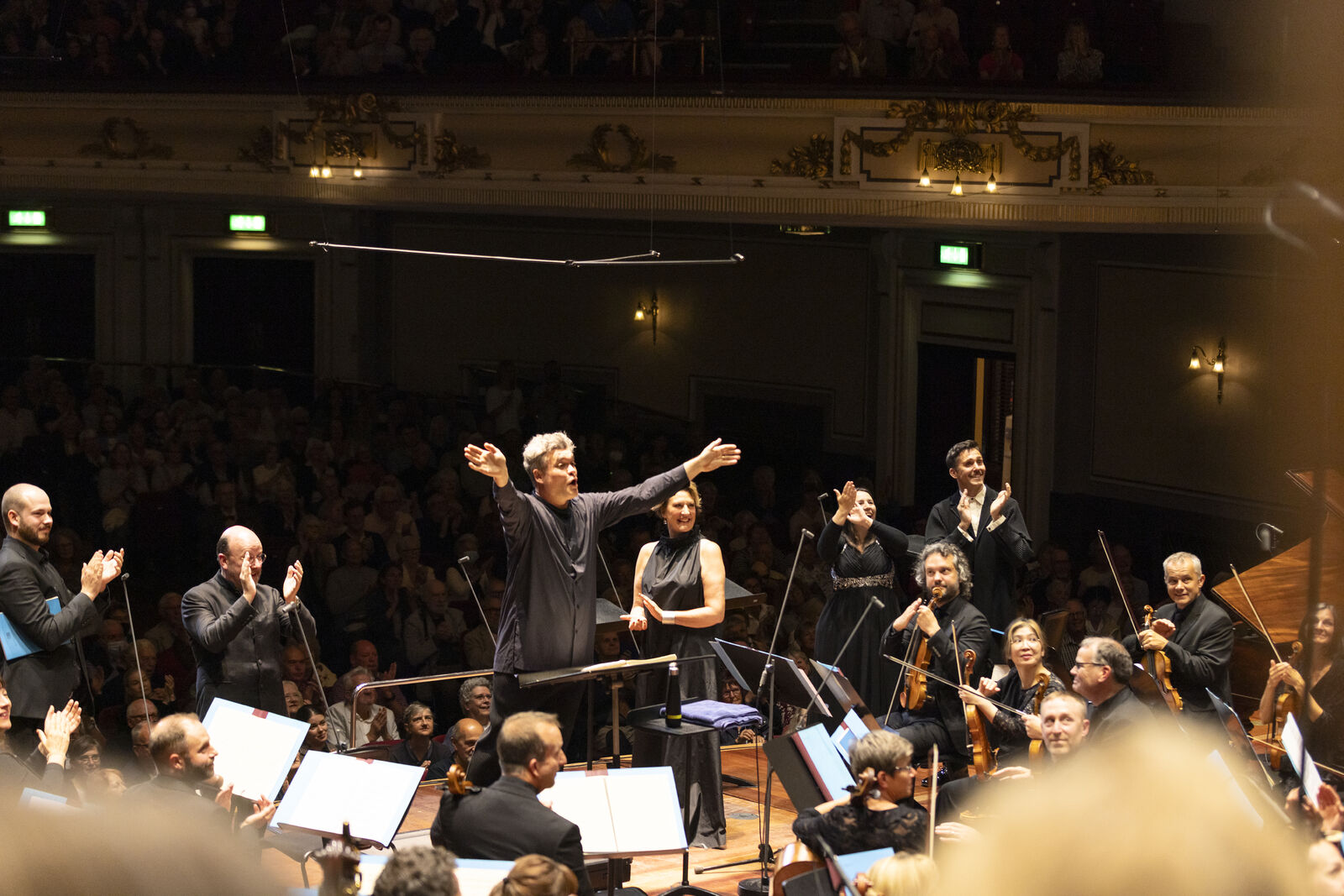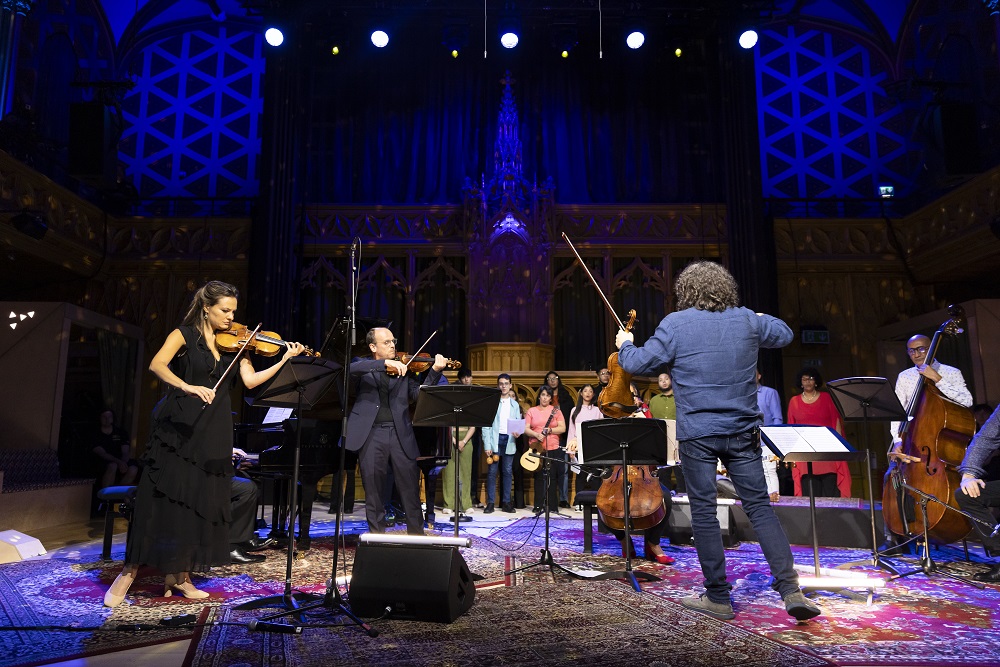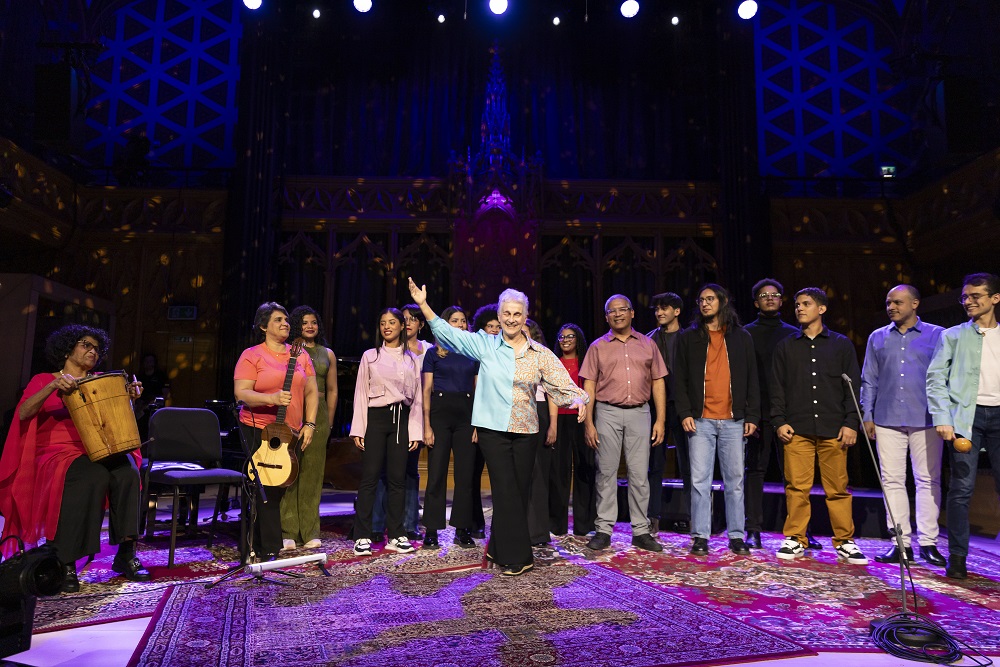Bach/Mendelssohn St Matthew Passion / First Night at the Hub, Edinburgh International Festival 2024 review - a reimagining and a joyous celebration | reviews, news & interviews
Bach/Mendelssohn St Matthew Passion / First Night at the Hub, Edinburgh International Festival 2024 review - a reimagining and a joyous celebration
Bach/Mendelssohn St Matthew Passion / First Night at the Hub, Edinburgh International Festival 2024 review - a reimagining and a joyous celebration
Familiar music in new clothes and a roof-raising

When I first started attending the Edinburgh International Festival in the 1990s, the Opening Concert (capitals intentional) was a grand Usher Hall affair on a Sunday evening; a central work of the western classical tradition to set the festival running. Not any more. They’ve steadily moved the opening of the festival forwards over the years (the first of 2024’s preview events took place last Thursday) and this year the opening concerts take place over not one but two nights.
The theme that director Nicola Benedetti has chosen for this year’s festival is Rituals that unite us, and the opening weekend focused on the central ritual of western Christendom: the commemoration of Christ’s sufferings and death as imagined by two highly contrasting works of music. Saturday night saw Osvaldo Golijov’s La Pasión según San Marcos, while the Sunday afternoon brought Bach’s St Matthew Passion (★★★★)  Not as you know it, however. In a thoughtful move, the festival programmed Mendelssohn’s 1841 realisation of Bach’s score, the one that he conducted in Leipzig and that spearheaded the 19th century Bach revival. It’s a shrewd decision, and not only because it exposed the audience to a new way of listening to a familiar work. Hearing Mendelssohn’s conversation with Bach’s score draws the spotlight onto a crucial turning point in the history of western classical music and forces us to consider that our listening habits are much more of a shifting palimpsest than we might be comfortable thinking. Habits are formed and orthodoxies change over a long period of time.
Not as you know it, however. In a thoughtful move, the festival programmed Mendelssohn’s 1841 realisation of Bach’s score, the one that he conducted in Leipzig and that spearheaded the 19th century Bach revival. It’s a shrewd decision, and not only because it exposed the audience to a new way of listening to a familiar work. Hearing Mendelssohn’s conversation with Bach’s score draws the spotlight onto a crucial turning point in the history of western classical music and forces us to consider that our listening habits are much more of a shifting palimpsest than we might be comfortable thinking. Habits are formed and orthodoxies change over a long period of time.
Nowadays we’re much more used to hearing the Matthew Passion performed by small ensembles using 18th century instruments, but a big-boned performance like this, with a modern symphony orchestra and a choir of more than a hundred, is an important antidote to anyone who thinks that nobody who performed this music before Harnoncourt was getting it right.
 It's fascinating listening to the Passion in Mendelssohn’s realisation, like meeting an old friend in a new outfit. For one thing, it’s a heck of a lot shorter. Lots of arias and many of the chorales hit the cutting room floor, so that both parts are just one hour long, and the narrative of the Biblical text very much has the prominence over the reflective arias. Twice in the second half, the alto sings her introductory recitative but we don’t get the aria we’d expect to follow, and elsewhere when you do get an aria the obligato generally gets much more orchestral support, the textures fleshed out to create more body. The most striking (or do I mean egregious?) example is the pair of clarinets that purl their way through Aus liebe, and you get the full string section providing the halo around Jesus’ words in the Gospel narrative, as well as a fortepiano for the recitatives.
It's fascinating listening to the Passion in Mendelssohn’s realisation, like meeting an old friend in a new outfit. For one thing, it’s a heck of a lot shorter. Lots of arias and many of the chorales hit the cutting room floor, so that both parts are just one hour long, and the narrative of the Biblical text very much has the prominence over the reflective arias. Twice in the second half, the alto sings her introductory recitative but we don’t get the aria we’d expect to follow, and elsewhere when you do get an aria the obligato generally gets much more orchestral support, the textures fleshed out to create more body. The most striking (or do I mean egregious?) example is the pair of clarinets that purl their way through Aus liebe, and you get the full string section providing the halo around Jesus’ words in the Gospel narrative, as well as a fortepiano for the recitatives.
And then there’s the scale. The first thing that hits you is the sheer weight of the sound. The first tread of the opening carries terrific heft when you’re used to hearing performances from the English Baroque Soloists or the Dunedin Consort. This BBC Scottish Symphony Orchestra performance contained six cellos, four double basses, quadruple flutes and oboes, even a contrabassoon, for heaven’s sake! And that was even before the chorus began to sing! When they entered the Edinburgh Festival Chorus and the RSNO Youth Chorus seemed to sing with all the heft of a football crowd, and they carried that with even more conviction during the crowd scenes of the narrative, especially the sequence before Pilate. It was in some ways ridiculous, but in many ways wonderful, and Ryan Wigglesworth conducted the whole vast crew as though he understood that it was both at the same time.
The solo singing was a little more mixed, though. Ed Lyon sang an expressive Evangelist but with a touch of strain that meant he never sounded comfortable, while Neal Davies’ Christus seemed a little withdrawn. Elizabeth Watts sang the soprano solos competently but with little bloom, while James Atkinson’s bass was too gravelly for comfort. Dame Sarah Connolly brought lustrous beauty to the alto solos, though Mendelssohn gives her greatest number, "Erbarme dich", to the soprano. Finest of all was Laurence Kilsby’s tenor; golden, honeyed and sensationally beautiful (Kilsby pictured above). It’s a shame Mendelssohn left him only one aria to sing. So in some ways this performance did all that an opening concert should: it created a sense of occasion but also of musical discovery. However, if you wanted both of those you’d have got them in spades that evening at the first of the festival’s late nights at the Hub (pictured above). These were the surprise successes of Benedetti’s first year: late evening concerts in the EIF’s headquarters at the top of the Royal Mile with specially invited artists, but you never quite knew what was being played until the concert began. In fact, you often got the impression that the artists weren’t sure either, and for the very first night the audience weren’t even told who the artists were going to be.
So in some ways this performance did all that an opening concert should: it created a sense of occasion but also of musical discovery. However, if you wanted both of those you’d have got them in spades that evening at the first of the festival’s late nights at the Hub (pictured above). These were the surprise successes of Benedetti’s first year: late evening concerts in the EIF’s headquarters at the top of the Royal Mile with specially invited artists, but you never quite knew what was being played until the concert began. In fact, you often got the impression that the artists weren’t sure either, and for the very first night the audience weren’t even told who the artists were going to be.
Last year, the first night turned into a joyous celebration of whoever was in town, a crew of top musicians seemingly jamming together for their own pleasure, and the audience invited in to eavesdrop. It was that night, more than any other, that made me lose any doubts I’d had over Benedetti being appointed EIF director: only a musician like her could get that crew together, people who knew her, respected her, and jumped at the chance to play with her.  And, darn it, she’s only gone and done it again. This year’s first night (★★★★) again featured a range of stars from across the opening weekend, with a heavy input from María Guinand and her Schola Cantorum de Venezuela, who sang, bopped, and maraca’d their way through several numbers (pictured above). Osvaldo Golijov introduced some members of Orquesta La Pasión, who played a merengue that didn’t seem to coordinate but which didn’t seem to bother anyone. The Leonore Trio played the slow movement of Beethoven’s Ghost Trio, and Sarah Connolly finally got to sing "Erbarme dich", this time with Benedetti herself playing the violin obbligato.
And, darn it, she’s only gone and done it again. This year’s first night (★★★★) again featured a range of stars from across the opening weekend, with a heavy input from María Guinand and her Schola Cantorum de Venezuela, who sang, bopped, and maraca’d their way through several numbers (pictured above). Osvaldo Golijov introduced some members of Orquesta La Pasión, who played a merengue that didn’t seem to coordinate but which didn’t seem to bother anyone. The Leonore Trio played the slow movement of Beethoven’s Ghost Trio, and Sarah Connolly finally got to sing "Erbarme dich", this time with Benedetti herself playing the violin obbligato.
It was celebratory, joyous and had the genuine feeling that you didn’t know what was coming next, which is a rare thing in the musical world. Maybe it didn’t quite feature that lightning-in-a-bottle feeling of 2023’s first night: was there a little too much reliance on the South American contingent and not enough from elsewhere? Never mind, because the final number, when everyone joined together on stage to play a landscape of music ranging across oceans and continents, was a powerful illustration of Benedetti’s ideal of breaking down barriers. And it had some terrific tunes in it, too.
Explore topics
Share this article
The future of Arts Journalism
You can stop theartsdesk.com closing!
We urgently need financing to survive. Our fundraising drive has thus far raised £49,000 but we need to reach £100,000 or we will be forced to close. Please contribute here: https://gofund.me/c3f6033d
And if you can forward this information to anyone who might assist, we’d be grateful.

Subscribe to theartsdesk.com
Thank you for continuing to read our work on theartsdesk.com. For unlimited access to every article in its entirety, including our archive of more than 15,000 pieces, we're asking for £5 per month or £40 per year. We feel it's a very good deal, and hope you do too.
To take a subscription now simply click here.
And if you're looking for that extra gift for a friend or family member, why not treat them to a theartsdesk.com gift subscription?
more Classical music
 Bizet in 150th anniversary year: rich and rare French offerings from Palazzetto Bru Zane
Specialists in French romantic music unveil a treasure trove both live and on disc
Bizet in 150th anniversary year: rich and rare French offerings from Palazzetto Bru Zane
Specialists in French romantic music unveil a treasure trove both live and on disc
 Scottish Chamber Orchestra, Ibragimova, Queen’s Hall, Edinburgh review - rarities, novelties and drumrolls
A pity the SCO didn't pick a better showcase for a shining guest artist
Scottish Chamber Orchestra, Ibragimova, Queen’s Hall, Edinburgh review - rarities, novelties and drumrolls
A pity the SCO didn't pick a better showcase for a shining guest artist
 Kilsby, Parkes, Sinfonia of London, Wilson, Barbican review - string things zing and sing in expert hands
British masterpieces for strings plus other-worldly tenor and horn - and a muscular rarity
Kilsby, Parkes, Sinfonia of London, Wilson, Barbican review - string things zing and sing in expert hands
British masterpieces for strings plus other-worldly tenor and horn - and a muscular rarity
 From Historical to Hip-Hop, Classically Black Music Festival, Kings Place review - a cluster of impressive stars for the future
From quasi-Mozartian elegance to the gritty humour of a kitchen inspection
From Historical to Hip-Hop, Classically Black Music Festival, Kings Place review - a cluster of impressive stars for the future
From quasi-Mozartian elegance to the gritty humour of a kitchen inspection
 Shibe, LSO, Adès, Barbican review - gaudy and glorious new music alongside serene Sibelius
Adès’s passion makes persuasive case for the music he loves, both new and old
Shibe, LSO, Adès, Barbican review - gaudy and glorious new music alongside serene Sibelius
Adès’s passion makes persuasive case for the music he loves, both new and old
 Anja Mittermüller, Richard Fu, Wigmore Hall review - a glorious hall debut
The Austrian mezzo shines - at the age of 22
Anja Mittermüller, Richard Fu, Wigmore Hall review - a glorious hall debut
The Austrian mezzo shines - at the age of 22
 First Person: clarinettist Oliver Pashley on the new horizons of The Hermes Experiment's latest album
Compositions by members of this unusual quartet feature for the first time
First Person: clarinettist Oliver Pashley on the new horizons of The Hermes Experiment's latest album
Compositions by members of this unusual quartet feature for the first time
 Gesualdo Passione, Les Arts Florissants, Amala Dior Company, Barbican review - inspired collaboration excavates the music's humanity
At times it was like watching an anarchic religious procession
Gesualdo Passione, Les Arts Florissants, Amala Dior Company, Barbican review - inspired collaboration excavates the music's humanity
At times it was like watching an anarchic religious procession
 Classical CDs: Camels, concrete and cabaret
An influential American composer's 90th birthday box, plus British piano concertos and a father-and-son duo
Classical CDs: Camels, concrete and cabaret
An influential American composer's 90th birthday box, plus British piano concertos and a father-and-son duo
 Cockerham, Manchester Camerata, Sheen, Martin Harris Centre, Manchester review - re-enacting the dawn of modernism
Two UK premieres added to three miniatures from a seminal event of January 1914
Cockerham, Manchester Camerata, Sheen, Martin Harris Centre, Manchester review - re-enacting the dawn of modernism
Two UK premieres added to three miniatures from a seminal event of January 1914
 Kempf, Brno Philharmonic, Davies, Bridgewater Hall, Manchester review - European tradition meets American jazz
Bouncing Czechs enjoy their Gershwin and Brubeck alongside Janáček and Dvořák
Kempf, Brno Philharmonic, Davies, Bridgewater Hall, Manchester review - European tradition meets American jazz
Bouncing Czechs enjoy their Gershwin and Brubeck alongside Janáček and Dvořák
 Solomon, OAE, Butt, QEH review - daft Biblical whitewashing with great choruses
Even a top soprano and mezzo can’t make this Handel paean wholly convincing
Solomon, OAE, Butt, QEH review - daft Biblical whitewashing with great choruses
Even a top soprano and mezzo can’t make this Handel paean wholly convincing

Add comment